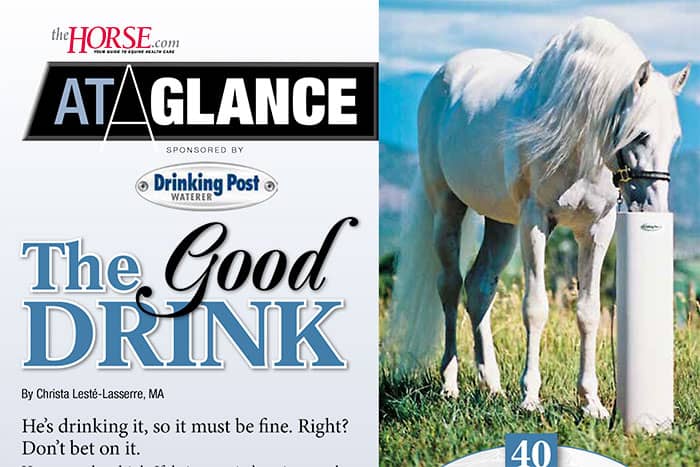
Equine Innovators: Dr. Amanda Adams Talks About Older Horses
Dr. Amanda Adams of the University of Kentucky, in Lexington, describes her senior horse research, which focuses on EMS, PPID, and immune system health.

Dr. Amanda Adams of the University of Kentucky, in Lexington, describes her senior horse research, which focuses on EMS, PPID, and immune system health.

To ensure your horse stays hydrated, provide him with fresh, clean, clear water at appropriate drinking temperatures. Here’s how.

Good nutrition and attention to GI health are the best ways to prevent leaky gut syndrome and heal horses with leaky guts.

Readers submitted photos showing how they haven’t let 2020 or the COVID-19 pandemic get in the way of quality time spent with their horses.

Learn about the science behind creating safe racing surfaces from Mick Peterson, PhD, director of the University of Kentucky’s Racetrack Safety Program.

Find out why early evacuation is always your best bet. Dr. Rebecca Gimenez-Husted explains.

Readers submitted photos of their horses with chrome and shared why they would benefit from a prize pack including sunblock.

Learn about the risk factors associated with horses getting gastric ulcers, as well as diagnosis and basic management and treatment.

Your horse’s head, face, and mouth comprise sensitive nerves, bone, and soft tissue. While many of us focus on saddle fit, bridles and bits often get overlooked as a cause of discomfort. Bits can cause mouth pain and injury, and research shows many nosebands are adjusted too tight to the point of cruelty. Is your horse wearing the right bit and bridle?

In mares, unwanted and nervous behaviors often get blamed on estrus. However, that’s often not really the cause. Dr. Jenny Biehunko explains.

Drs. Jenny Biehunko and Camie Heleski touch on how nutrition might or might not affect horse behavior.

Horses have a good sense of smell. Drs. Jenny Biehunko and Camie Heleski talk about how scents and pheromones might help calm horses, especially during travel.

From learning theory and counterconditioning to supplements and pharmaceutical options, we’ll take a look at ways to safely help nervous, high-strung, and energetic horses relax. Sponsored by Confidence EQ by Bimeda.

Dr. Laurie Lawrence, from the University of Kentucky, describes ways to make sure your older horse is getting enough forage.

Dr. Stephen Duren shares information about alfalfa’s calorie density and recommends how and when to feed it.

Dr. Stephen Duren outlines the best forage for free feeding horses with insulin resistance that might be susceptible to laminitis.
Stay on top of the most recent Horse Health news with
"*" indicates required fields